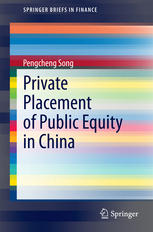

Most ebook files are in PDF format, so you can easily read them using various software such as Foxit Reader or directly on the Google Chrome browser.
Some ebook files are released by publishers in other formats such as .awz, .mobi, .epub, .fb2, etc. You may need to install specific software to read these formats on mobile/PC, such as Calibre.
Please read the tutorial at this link: https://ebookbell.com/faq
We offer FREE conversion to the popular formats you request; however, this may take some time. Therefore, right after payment, please email us, and we will try to provide the service as quickly as possible.
For some exceptional file formats or broken links (if any), please refrain from opening any disputes. Instead, email us first, and we will try to assist within a maximum of 6 hours.
EbookBell Team

0.0
0 reviewsBy retrieving entries from the financial-data vendor Wind and collecting relevant data from private placement statements, the author builds a proprietary database and studies five aspects of private placement in China. He examines which listed firms are more likely to choose private placement over SEO in refinancing; he looks into the controlling shareholder’s decision on whether or not to purchase privately placed shares; he investigates how the offer discount is determined; he calculates announcement periods for abnormal returns on private placements. Where the abnormal return is significantly positive, he documents positive long-run abnormal return on private offerings and evidence supporting the under-reaction hypothesis. Finally, he concludes that the largest shareholders tunnel by means of excess discounts from which they benefit but which is harmful to other shareholders.